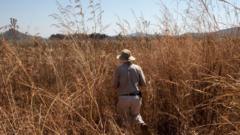This compensation initiative, part of a broader agreement, aims to resolve conflicts stemming from controversial land reforms that began over two decades ago.
Zimbabwe Initiates First Compensation Payments to White Farmers Post-Land Reforms

Zimbabwe Initiates First Compensation Payments to White Farmers Post-Land Reforms
An initial compensation payment marks a significant step in addressing historic land seizures and mending international relations.
The Zimbabwean government has taken a historic step by announcing an initial compensation payment of US$3 million (£2.3 million) to white farmers whose lands were seized during a divisive land reform initiative that started more than twenty years ago. This funding is the first disbursement made under a 2020 compensation agreement, in which the government committed to a total payment of US$3.5 billion (£2.6 billion) for displaced farmers.
Aimed at rectifying colonial-era injustices, the land seizures in 2000 and 2001 were marked by violence and led to a significant economic downturn in Zimbabwe, souring ties with Western nations. The recent announcement includes compensation covering 378 out of the approved 740 farms, representing just 1% of the total $311 million allocated for this initial phase. The remaining compensation will be disbursed through US-dollar denominated Treasury bonds, as stated by Finance Minister Mthuli Ncube.
"The commitment to reform the Zimbabwean economy includes compensating former farm owners, honoring our agreement as we progress,” Ncube remarked. According to Harry Orphanides, a representative for the farmers, more individuals are now expressing interest in the compensation agreements. However, a majority of the affected farmers have hesitated to engage, still holding onto their title deeds.
Importantly, the government has limited compensation to cover only "improvements" made on the land, refusing to acknowledge the land itself as compensable, citing its colonial theft. Foreign-owned farms have also been prioritized in separate negotiations for compensation.
This compensation initiative comes as part of a broader effort by President Emmerson Mnangagwa, who succeeded Robert Mugabe in the wake of a 2017 coup, to mend relations with Western nations. While maintaining that land reform is irreversible, Mnangagwa recognizes compensation as crucial for reconnecting with the global community.
For over two decades, Zimbabwe has faced isolation from international financial systems, grappling with substantial foreign debt. Analysts see this initial payment as a pivotal moment for repairing diplomatic relationships and potentially avoiding international judgment against Zimbabwe as it endeavors to revive its beleaguered economy.
Aimed at rectifying colonial-era injustices, the land seizures in 2000 and 2001 were marked by violence and led to a significant economic downturn in Zimbabwe, souring ties with Western nations. The recent announcement includes compensation covering 378 out of the approved 740 farms, representing just 1% of the total $311 million allocated for this initial phase. The remaining compensation will be disbursed through US-dollar denominated Treasury bonds, as stated by Finance Minister Mthuli Ncube.
"The commitment to reform the Zimbabwean economy includes compensating former farm owners, honoring our agreement as we progress,” Ncube remarked. According to Harry Orphanides, a representative for the farmers, more individuals are now expressing interest in the compensation agreements. However, a majority of the affected farmers have hesitated to engage, still holding onto their title deeds.
Importantly, the government has limited compensation to cover only "improvements" made on the land, refusing to acknowledge the land itself as compensable, citing its colonial theft. Foreign-owned farms have also been prioritized in separate negotiations for compensation.
This compensation initiative comes as part of a broader effort by President Emmerson Mnangagwa, who succeeded Robert Mugabe in the wake of a 2017 coup, to mend relations with Western nations. While maintaining that land reform is irreversible, Mnangagwa recognizes compensation as crucial for reconnecting with the global community.
For over two decades, Zimbabwe has faced isolation from international financial systems, grappling with substantial foreign debt. Analysts see this initial payment as a pivotal moment for repairing diplomatic relationships and potentially avoiding international judgment against Zimbabwe as it endeavors to revive its beleaguered economy.




















